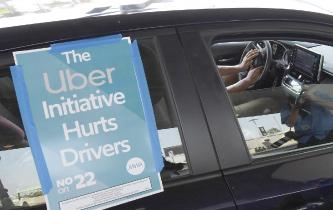You are here
‘Gig economy’ lives on after California passes Uber-led referendum
By AFP - Nov 04,2020 - Last updated at Nov 04,2020

A ride share driver participates in a protest by drivers and their supporters, at Los Angeles International Airport in Los Angeles, California, on August 20 (AFP photo)
SAN FRANCISCO — The so-called "gig economy" survived a key test in Tuesday's election as California voters approved a referendum backed by ride-hailing giants such as Uber which preserves the use of contractor-drivers and potentially opens the door to wider adoption of that model.
The initiative known as Proposition 22 backed by Uber, Lyft and other on-demand companies appeared headed for passage as the measure was backed by some 58 per cent of state voters, according to incomplete results.
The measure effectively overturns a state law which would require the ride-hailing firms and others to reclassify their drivers and provide employee benefits.
The vote came after a contentious campaign with labour groups claiming the initiative would erode worker rights and benefits, and with backers arguing for a new, flexible economic model.
"With the passage of Prop 22, app-based rideshare and delivery drivers across the state will be able to maintain their independence, plus have access to historic new benefits, like a minimum earnings guarantee and health care," said a statement from Yes on 22, a coalition of drivers, businesses and activist groups with funding from Uber, Lyft and delivery firm DoorDash.
It said the result represents a "massive win" for firms like Uber and Lyft, whose business model appeared threatened in their home state.
Daniel Ives of Wedbush Securities said the vote offers a clear approval of the gig economy model, noting that if it had failed "this would significantly impact the core DNA of the gig economy and ultimately the revenue model for Lyft and Uber."
Ives added that a defeat for Proposition 22 might have encouraged other states for follow suit, potentially eroding the outlook for ride-hailing firms.
Uber and Lyft have pledged that if the measure passed, they would set aside funds for health and insurance benefits for their drivers, many of whom work part-time on a flexible schedule.
"The future of independent work is more secure because so many drivers like you spoke up and made your voice heard — and voters across the state listened," Uber chief executive Dara Khosrowshahi said in an email to its drivers late Tuesday.
"We're looking forward to bringing you these new benefits — like healthcare contributions and occupational accident insurance — as soon as possible."
The proposition was also being looked at "nationally and globally" for what it might mean to the future of the labour movement, according to Sonoma University political science professor David McCuan.
"It's about how gig workers use gig jobs as a bridge, not as a career. And it's about the future of the labour movement in California," McCuan said.
Arun Sundararajan, a New York University professor who specializes in the "sharing economy," said the vote was a milestone for independent workers.
"The country now has its first framework for funding non-employment worker benefits," Sundararajan said.
"This will be increasingly important over time, as a greater fraction of the workforce has an arrangement other than full-time employment."
But Darrell West, who heads the Brookings Institution's Center for Technology Innovation, called the result "a major loss for the labour movement and advocates who want a better social contract for gig workers."
"The result shows it will be awhile before new rules for the digital economy are going to get liberalized in the United States," West said.
Erica Mighetto, an Uber driver who campaigned for the "no" vote along with labour organisations, expressed disappointment over the vote.
"We're deeply saddened that Uber and Lyft have been able to confuse voters," she said. "And this is really devastating and harmful to us."
Uber and Lyft argued that many drivers sought the flexibility of being able to work when and where they choose to pick up extra income.
More than $200 million was spent promoting Proposition 22, while only a tenth of that amount was spent by labour groups opposing the measure.
Under the proposition, drivers remain independent contractors but Uber and Lyft are to pay them a number of benefits including a minimum wage, a contribution to healthcare and other forms of insurance. Critics of the measure said it failed to take into account the full costs borne by drivers.
Lyft driver Jan Krueger of Rancho Cordova supported the proposition, saying that it struck a balance between independence and job benefits.
"This vote in one of the most progressive states in the country should send a strong signal to elected leaders all over the nation," Krueger said.
"Prop 22 should serve as a model for other states and the federal government to follow."
Uber and Lyft claimed most drivers support the contractor model. But the firms were sued by the state which argued keeping that model violated California labour law. A Proposition 22 victory renders the court case effectively moot.
Related Articles
LOS ANGELES/NEW YORK — Lyft Inc’s.
LONDON — US ride-hailing giant Uber on Friday launched a pension scheme for its UK drivers after a court ruled they were entitled to workers
The growth of ride-hailing companies such as Uber and Lyft so far has not been hindered by limits from government regulators and campaigns by taxicab competitors.

















